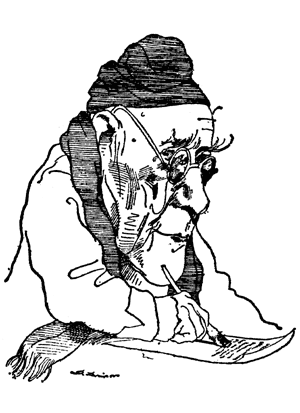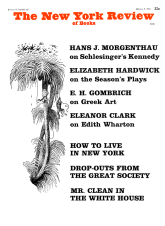Were I to describe this book in the kind of language into which it has been “translated,” I should say that it is of a comic quite extraordinary. Think then! André Gide, that man so unbelieving, is in his late years the friend of Claude, son of that so Catholic writer, François Mauriac. That son, on his side, intuits the genius of those two giants of French letters and has no desire dearer than to effectuate their conjunction in the Mauriac property of Malagar, in the environs penetrated by the odor of pine of Bordeaux. Down there, before a view the most magnificent in the world, and in an adorable sunlight, those two mâitres are quite off their guards and speak the one to the other with open heart. How droll that moment when Gide, with his deep voice with many trills, reads aloud to Mauriac that passage of the Old Testament where it is a question of the Angels of the Lord who risk to be sodomized by the Sodomites! Claude consigns in writing many of those exchanges…and any reader who knows French well enough to put the text back into the original will be able to guess the meaning in those many places where it has disappeared through the linguistic cracks.
Robert Phelps’s Introduction, although it contains five mistakes in French, intended no doubt to keep it in harmony with the waywardness of the “translation,” gives a good description of the self-consciousness of French writers, who take themselves very seriously as public figures and tend to be always analyzing the finer shades of their relationships both with themselves and with their contemporaries. They usually have a sense of irony but are often devoid of what, in the Anglo-American context, we would call humor. For all their gifts, André Gide and François Mauriac appear in this book rather like two elderly coquettes doing a complicated modesty display dance for each other’s benefit, with Claude running from one to the other and keeping the score. Claude himself is a mysterious case. There are so many well told, funny episodes in the book that one might suspect him of having written it all with his tongue in his cheek. But like Eckermann or Boswell, he seems at once profoundly convinced of the greatness of his great man and yet puts things in such a way that the human foibles of his subject are brought out with particular clarity. In the following passage, for instance, Claude Mauriac’s ambiguity of tone, Mr. Lebeck’s aberrant use of language, and the peculiarities of André Gide’s temperament combine to produce a quite hilarious effect (the italics render Gide’s eccentric habit of emphasis, which any interested person can study from the phonograph records of his voice):
So he [Gide] too has had some encounters in this life which he alone would be able to appreciate. Witness this marvel which he relates—with the greatest simplicity: a shepherd in the Pyrenees covered a packet of notebooks with his scrawl. Astonishing journal, in which one sees life in the village and in the mountains, in which one sees a new religion created to personify the spirit of his flock…And the real marvel, of course, that this document should have fallen into the hands of André Gide: “What an extraordinary, what a magnificent study…One day one of his lambs fell into a crevasse, and died. He felt an overpowering surge of erotic passion that lasted as long as the cadaver was warm. As a result of that adventure he possessed every animal in the flock one after the other right down to the oldest ram. An astonishing page relates his amours with a trout. This young man was haunted by the idea that he might be impotent…”
André Gide was sixty-eight when, in 1937, Claude Mauriac first saw him sitting alone in a cafe and went over to speak to him. By then, his wife, Madeleine Gide, was dying, he had broken with the Communist Party, and most of his literary work was behind him. In fact, he was so lost and so lonely—as he explained to Mauriac—that he had been twice to the cinema that very evening. A sort of friendship sprang up between them, partly curiosity and hero-worship on Mauriac’s side and partly an automatic response to youth on Gide’s During the next two years they saw quite a lot of each other in Paris or the provinces and Mauriac kept a fairly full diary of their meetings. His evidence does not reveal any unexpected features; it amplifies the portrait given by those other people who have described Gide most effectively, e.g., Roger Martin du Gard, Mme Théo van Rysselberghe, Pierre Herbart, Albert Camus, and, of course, Gide himself. He appears once again as a fluctuating, shy, childish, precious, subtle, naive, impish, egocentric, good-hearted, stubborn, and extraordinarily cultured man. Claude Mauriac describes him in conjunction with three of his famous contemporaries—Jouhandeau. another confessionalist with whom they dined one evening, Cocteau, for whom Gide always felt detestation and sexual jealousy tinged with admiration, and François Mauriac, who represented the liberal Christian attitude, as opposed to Gide’s liberal, non-Christian position.
Advertisement
At first sight, it might seem unlikely that Gide and François Mauriac, being on opposite sides of the religious fence, could spend two weeks together in the country, alone with Claude. But their background was almost identical they had received the same kind of bourgeois education, they had the same passion for literature and so could quote poetry to each other by the hour, even coinciding in their appreciation of Paul Claudel’s violently Catholic writings, although both of them, for different reasons, had expressed public disapproval of Claudel. However, Gide showed his cloven hoof before the end of the stay by reading out dubious passages from the Old Testament with great relish, eyeing Claude the while. A slight haze of uncertainty hangs over the narrative: Claude presents himself very carefully as being heterosexual, but perhaps Gide thought he might win another recruit to homosexuality, and a valuable recruit from inside the camp of respectability. When they met again after the Liberation, their friendship had evaporated. Claude gives no explanation of this fact and it may be that, four or five years having elapsed, he no longer had the youthfulness that had perhaps been one of the reasons for Gide’s attraction to him.
The book throws no new light on the central problem in Gide’s life, from which so much of his writing sprang: his non-physical love-relationship with his wife and her long, silent martyrdom while he became world-famous as the apologist of pederasty. He confesses to Claude Mauriac, as he did to Camus, that he had no idea that women had sexual appetites and did not realize until it was too late that Madeleine Gide might have liked to have a child by him. It seems incredible that any man, and more especially a Frenchman, should be so ignorant of female sexuality, particularly when he had had mistresses and had even fathered the child of another woman. The statement is still more puzzling when one remembers that, in L’Immoraliste, one of the books directly reflecting his dilemma, he makes the young wife, who corresponds to Madeleine Gide, die in childbirth; perhaps, however, this was a way of unconsciously recognizing that she did want a child and that it would inevitably be still-born so far as he was concerned. How or why he eventually had a child with a woman about whom there is little or nothing of relevance in his diaries has never been revealed, although contradictory anecdotes have circulated from time to time. The most likely explanation of the tangle of his relationship with his wife is the one suggested by M. Jean Delay in La Jeunesse d’André Gide: Madeleine Gide was probably a mother-substitute, whom Gide married immediately after his mother’s death. If this was so, he must have both loved and hated her, as he had loved and hated his mother, and there was something sadistic in the way he boldly flaunted his homosexuality in his books without ever, on any occasion, discussing it with his wife or considering what she might suffer as a result of his revelations. He made her a silent martyr to his own courage, and even his courage, one suspects, may have been partly the resentful child’s way of getting his own back on his dead mother. All his writing about sexual freedom would be so much more acceptable if one did not see in the background the mute, prim figure of the dessicated mother/wife. In view of the messiness of this situation, one might even appreciate in contrast the pure, if glacial charm of amours with a trout.
This Issue
January 6, 1966




